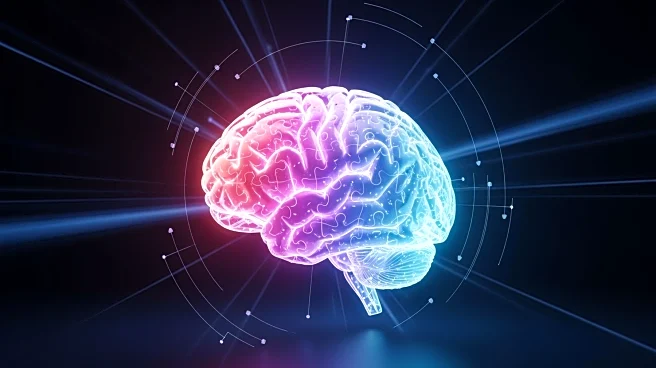What's Happening?
A clinical trial conducted by McGill University has demonstrated that digital brain training through the BrainHQ app can restore key brain functions that typically decline with age. The study involved
92 healthy adults aged 65 and older, who participated in 10 weeks of cognitive exercises using BrainHQ. The results showed significant improvements in cholinergic function, a chemical system in the brain crucial for attention, memory, and decision-making. This improvement is akin to reversing a decade of brain aging, as participants exhibited brain chemistry similar to individuals 10 years younger. The study highlights BrainHQ's potential as a non-drug intervention to lower dementia risk and enhance mental performance.
Why It's Important?
The findings from McGill University's study are significant as they offer a promising alternative to medication for preserving cognitive health in older adults. With Alzheimer's disease characterized by declines in cholinergic function, BrainHQ's ability to enhance this system could reduce dementia risk and improve mental performance. This approach provides a safer option for cognitive enhancement, potentially benefiting millions of older adults seeking to maintain their mental acuity. The study also underscores the importance of targeted cognitive training in promoting neuroplasticity, challenging the notion that traditional activities like crossword puzzles are sufficient for brain health.
What's Next?
The research team at McGill University is preparing a follow-up study to investigate whether BrainHQ can benefit individuals in the early stages of dementia. This next phase aims to explore the app's potential in a broader context of cognitive decline, potentially offering new avenues for early intervention in dementia care. As BrainHQ is already available to the public, clinicians may begin discussing its use with patients interested in cognitive health, potentially leading to wider adoption of digital brain training as a standard practice in geriatric care.
Beyond the Headlines
The study conducted by McGill University not only highlights the potential of digital brain training but also raises ethical considerations regarding access to such technologies. As cognitive health becomes increasingly reliant on digital interventions, ensuring equitable access to these resources is crucial. Additionally, the study's reliance on advanced imaging technology, available at only a few centers worldwide, points to the need for broader dissemination of such capabilities to facilitate similar research and applications globally.









